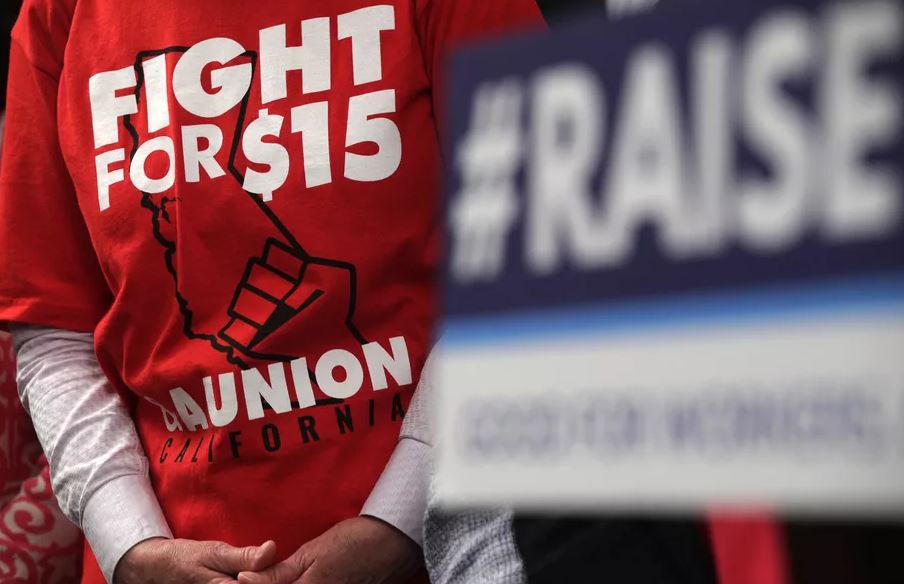The Senate parliamentarian says the minimum wage increase can’t be part of the stimulus bill.
The $15 minimum wage is effectively dead — for now.
The Senate parliamentarian, Elizabeth MacDonough, told senators on Thursday that the policy did not have a significant enough effect on the federal budget to be included as part of the $1.9 trillion Covid-19 relief bill. That decision — while one that Democrats could ignore — means there likely won’t be any more action on the minimum wage in the near term.
Democrats expressed disappointment at the decision.
SCHUMER: “We are deeply disappointed in this decision. We are not going to give up the fight to raise the minimum wage to $15 to help millions of struggling American workers and their families. The American people deserve it, and we are committed to making it a reality.”
— Erik Wasson (@elwasson) February 26, 2021
As Sen. Bernie Sanders (I-VT), a longtime champion of the $15 minimum wage, has previously said, Republican opposition to wage increases makes it unlikely lawmakers would be able to get the proposal through via regular order — which would need 60 votes. Budget reconciliation — the process that Democrats are utilizing to approve Covid-19 relief legislation — would only require 51.
“Let’s be clear. We are never going to get 10 Republicans to increase the minimum wage,” Sanders previously said. “The only way to increase the minimum wage to $15 an hour now is to pass it with 51 votes through budget reconciliation.”
The parliamentarian’s decision narrows the path for changes to the minimum wage in this Congress: Although Republicans have put forth their own $10 minimum wage bill, the likelihood of a compromise is exceedingly slim.
Democrats could still ignore the parliamentarian
While the parliamentarian has made her decision, Democrats do have one other option: They could ignore her ruling and keep the minimum wage in their legislation anyway. That’s a route many progressives have urged Democrats take — though moderates like Sens. Joe Manchin (D-WV) and Kyrsten Sinema (D-AZ) have lobbied against it.
It’s not a common practice — and it is seen as pretty partisan — but it would mean that Democrats are able to push the minimum wage through now, rather than banking on a compromise that may be a long time coming.
To do this, Democrats would simply keep the minimum wage in the relief bill, a move that would likely prompt a Republican challenge when the legislation hits the floor. At that time, the presiding officer could overrule that challenge and unless 60 members contest that decision, that ruling would stand.
Given signals from the White House — and enduring opposition from moderate Democrats — party leaders aren’t expected to use this approach, though they’ll still face pressure from progressives to do so.
The minimum wage has been stymied, again
The parliamentarian’s decision marks the latest instance of increases to the minimum wage getting stymied yet again.
Currently at $7.25, the federal minimum wage has not increased for more than a decade, even though an overwhelming majority of voters support changes to it. This week, a new Vox and Data for Progress poll found that 61 percent of likely voters would back a gradual minimum wage increase. In multiple Republican-leaning states, too, voters have supported ballot measures that would raise the minimum wage over time.
The Raise the Wage Act — which Democrats had pushed to keep in the relief package — would boost the minimum wage from $7.25 to $15 over the course of five years, and then peg additional updates to gains in the median wage. According to a Congressional Budget Office report, it had the potential to lift 900,000 people out of poverty and increase the pay of 27 million people.
Previously, the legislation had been blocked wholesale by Senate Republicans, who’ve expressed concerns about possible job losses and the burden this policy could impose on small business owners. (The Congressional Budget Office also estimates that the measure could cost 1.4 million jobs, though many economists think this figure is overblown.)
To get around GOP opposition, Democrats had fought for the inclusion of the policy in budget reconciliation — a move that’s been blocked this time around by procedural limitations.
Correction, February 25: A version of this article was published in error, wrongly stating that the parliamentarian ruled that the minimum wage increase was allowed under budget reconciliation.






